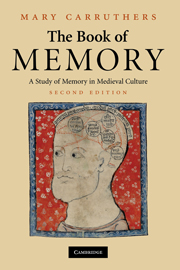Book contents
- Frontmatter
- Contents
- List of Illustrations
- Preface to the second edition
- List of Abbreviations
- Introduction
- CHAPTER 1 Models for the memory
- CHAPTER 2 Descriptions of the neuropsychology of memory
- CHAPTER 3 Elementary memory design
- CHAPTER 4 The arts of memory
- CHAPTER 5 Memory and the ethics of reading
- CHAPTER 6 Memory and authority
- CHAPTER 7 Memory and the book
- Appendix A
- Appendix B
- Appendix C
- Notes
- Bibliography
- Index of manuscripts
- General Index
Appendix B
Published online by Cambridge University Press: 05 January 2014
- Frontmatter
- Contents
- List of Illustrations
- Preface to the second edition
- List of Abbreviations
- Introduction
- CHAPTER 1 Models for the memory
- CHAPTER 2 Descriptions of the neuropsychology of memory
- CHAPTER 3 Elementary memory design
- CHAPTER 4 The arts of memory
- CHAPTER 5 Memory and the ethics of reading
- CHAPTER 6 Memory and authority
- CHAPTER 7 Memory and the book
- Appendix A
- Appendix B
- Appendix C
- Notes
- Bibliography
- Index of manuscripts
- General Index
Summary
ALBERTUS MAGNUS: DE BONO, TRACTATUS iv, QUAESTIO ii “DE PARTIBUS PRUDENTIAE”
Next, the properties of prudence are investigated. And we follow the three categories of three philosophers, namely Tullius [Cicero], Macrobius, and Aristotle.
First Tullius says at the end of his First Rhetoric [De inventione]: “there are three parts to prudence: memory, intelligence, foresight.” Macrobius, however, says in his Commentary on the Dream of Scipio: “the knowledge of prudence lies in intellect, circumspection, foresight, a willingness to learn, and caution.” And Aristotle at the end of the first Book of his Ethics says that the intellectual virtues are prudence [sapientia], phronēsis, and intelligence [intelligentia].
ARTICLE ONE: WHAT MEMORIA MIGHT BE
Let us inquire first concerning the word memoria, which Tullius only mentions. And we will inquire in two ways, namely concerning what it might be in itself, and concerning the art ofmemory which Tullius teaches. First therefore let us examine what memory is. Tullius says that ‘‘memory is the faculty by which the mind recalls things that were in the past’’ [De invent. II. 53, 160].
- Type
- Chapter
- Information
- The Book of MemoryA Study of Memory in Medieval Culture, pp. 345 - 360Publisher: Cambridge University PressPrint publication year: 2008



